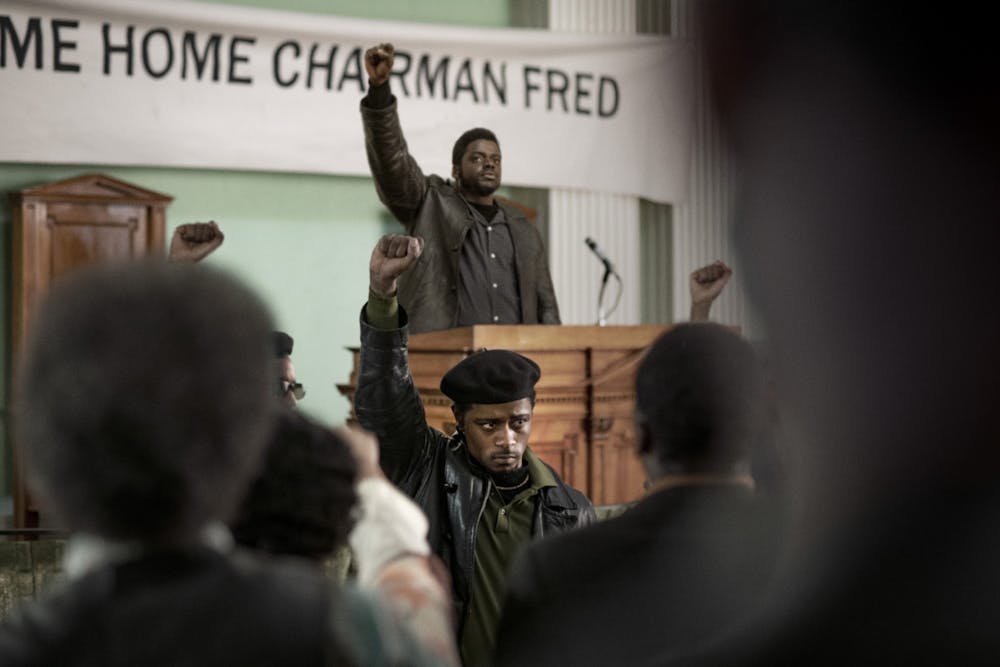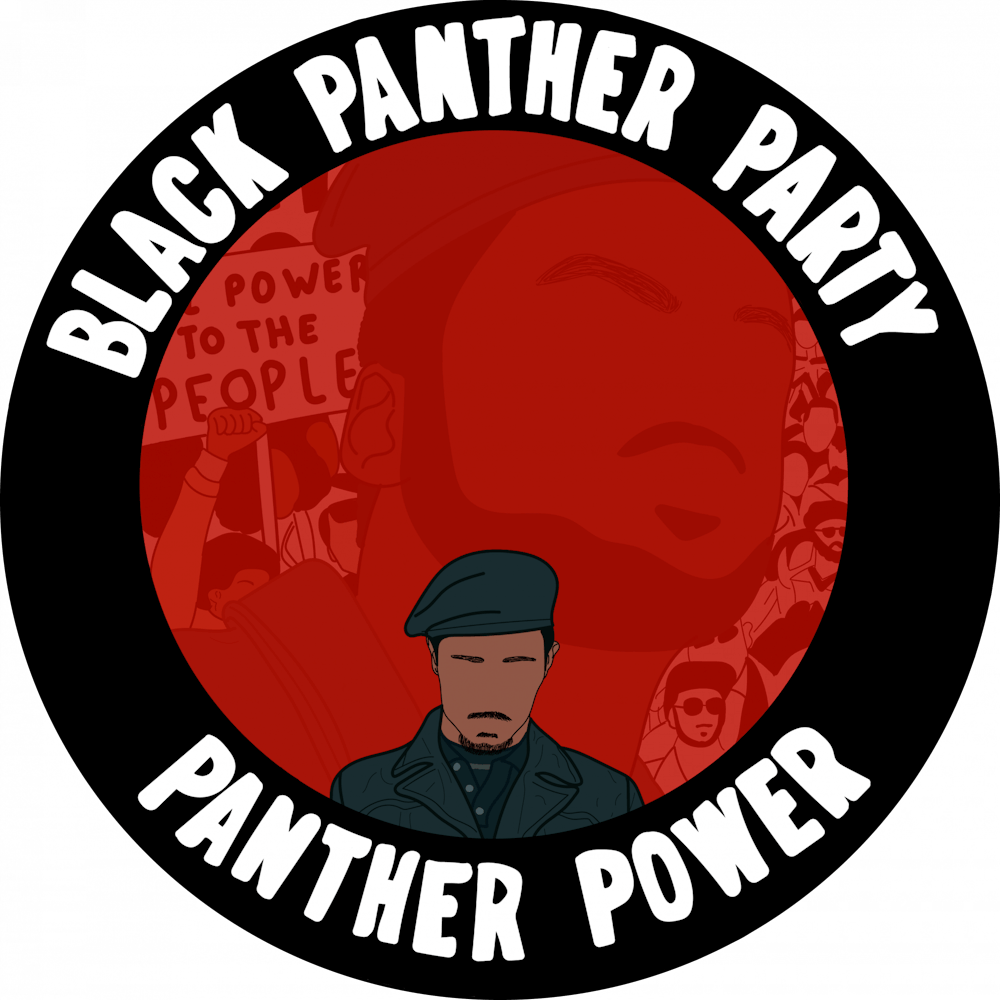Shaka King has made his directorial debut with “Judas and the Black Messiah,” a biopic detailing the betrayal of the chairman of the Black Panther Party’s Illinois chapter Fred Hampton, portrayed by Daniel Kaluuya, in the late 1960s. The film is told from the perspective of undercover FBI informant William O’Neal, portrayed by LaKeith Stanfield, whose infiltration of the chapter ultimately leads to Hampton’s assassination.
Complete with gorgeous cinematography and stellar performances, King expertly crafts the film narrative in a way that is extremely relevant to contemporary conversation, while stressing the importance of humanization.
In a roundtable discussion with college journalists, the main actors of “Judas” each shared their experiences working on the film and why they believe it’s important to view the film now.
Strengths of the Film: Cinematography and Performances
The color palette of this film is lovely. The lighting is often warm and muted, and the visual style echoes the Black cinema of the time. Often adorned in deep brown, olive green, and black, the Black actors’ skin tones are beautifully cast in golden shades, bringing their performances to life just that much more. In contrast to this favorable lighting, the scenes with white actors within the FBI are dim and cool-toned, giving them a sinister, washed-out effect.
The camerawork is also captivating. As mentioned before, the film is shot from Stanfield’s perspective. There are many shots taken from behind him, allowing the viewer to intimately witness what he’s witnessing. Slow pans around the agent’s face convey the intensity of his emotion. Kaluuya, meanwhile, often occupies low-angle shots that emphasize his tall, dignified stance, speaking to Hampton’s immense power and influence — and during his motivational speeches, he lives up to the film’s title of “Messiah.”

(Center front to back) LaKeith Stanfield as William O’Neal and Daniel Kaluuya as Chairman Fred Hampton in “Judas and the Black Messiah,” a Warner Bros. Pictures release.
Courtesy of Glen Wilson / Warner Bros. Pictures
Dominique Fishback portrays Deborah Johnson, Hampton’s significant other, and the chemistry between her and Kaluuya is playful and endearing. While most people see Hampton as a God-like figure with his intensity and charisma, Johnson challenges him to be a better person. Fishback captures this adeptly with her mastery of words and flirtatious exchanges with Kaluuya.

When asked how it felt working with Kaluuya, Fishback said, “I’d say that his superpower is that he can see people for who they are and where they’re at and meet them there. So he learns how to remove ego when telling stories, and therefore we’re able to play, and he’s able to be a support system for me and vice versa.”
“We knew that the story was bigger than us,” Fishback continues, “And we knew that we see Chairman Fred as this powerhouse person, but how do we humanize him? We get to humanize him in the moments where we see on a personal level that he is willing to grow and evolve and keep himself open.”

(Left to right) Daniel Kaluuya as Chairman Fred Hampton and Dominique Fishback as Deborah Johnson in “Judas and the Black Messiah,” a Warner Bros. Pictures release.
Courtesy of Warner Bros. Pictures
Stanfield also gives a superb performance. The paranoia he feels as an informant is tangible within every scene. But it is how he’s able to convey that fear while also diverting suspicion away from him that especially stands out.


(Left to right) Jesse Plemons as Roy Mitchell and Lakeith Stanfield as Bill O’Neal in “Judas and the Black Messiah,” a Warner Bros. Pictures release.
Courtesy of Warner Bros. Pictures
Stanfield describes his performance as “a tricky thing. Because, you know, in most of the scenes, it was like many things happening at once. Like he might be fearful in a scene but also thinking about how he looks to the Panthers and the paranoia of being caught, so we had to try and balance that. I worked with Shaka to be able to balance the performance in that way.”
Theme: The Importance of Humanization in the Movement for Racial Justice
The emotional core of this film is the nuanced way in which it handles all of its characters. The radical nature of the Black Panther Party has caused it to be demonized in American society and treated like a terrorist organization. On the other hand, those familiar with Hampton’s journey see him as an otherworldly figure, a Messiah. For King to tell the Party’s story while highlighting the humanity in all of its subjects is incredibly powerful. It reminds audiences that organizations like the Party and seemingly untouchable idols like Hampton are still people.
Indeed, the film emphasizes how any violent acts associated with the Party were outweighed by all the good it did for Chicago. It especially highlights how the Party would provide breakfast for and watch over young children, which delves into more of the humanitarian aspect instead of the political.
Furthermore, though Hampton still holds his Christ-like image throughout the film, he displays complex emotions — frustration, fear, and even shyness when he is around Deborah.
Even the antagonists of the film are not one-dimensional. Stanfield as O’Neal is indeed a betrayer and a spy, but he is also a young man scared for his own life and safety and forced to make difficult decisions, decisions that clearly weighed on the real-life O’Neal for the rest of his days. Roy Mitchell, portrayed by Jesse Plemons, is O’Neal’s FBI handler, and we get to see glimpses into how his career challenges his personal morals. And even Hampton’s formation of the Rainbow Coalition, with non-Black organizations who were initially adversarial, exemplifies the importance of unity and finding common ground among those who are different than oneself.
Through all of these depictions, the film’s message is clearly shown: people are human at their core, and the humanity of people should lie at the core of how you treat them.
Contemporary Relevance to Black Lives Matter
Though the story of the film takes place 50 years ago, King presents ideas that are ripe for discussion amongst contemporary audiences. There are instances of police brutality that, in line with the theme of humanization, make viewers question how they perceive Black victims. It examines the narratives that are portrayed about Black people who have lost their lives to police violence — how their sympathetic nature and right to justice is called into question if they had less than perfect histories. Algee Smith, who portrays Party member Jake Winters, expands on this phenomenon.
“We do only see the narrative of the media when something like this happens, and they try to flip it and then try to show you this [negative] side of this person that’s not even this person! Like where’s the humanity?”
Smith continues, “I just saw the other day that Trayvon Martin was supposed to turn 26, like a day or two ago. And we don’t get to see that. We don’t get to see the humanization of his life that he lived. All we get to see is what the media amplifies, and that’s scary. So I really just have to thank Shaka, our director and our writer, for creating that room and that open dialogue for that to be able to happen.”
Moreover, the film touches on how white people conceptualize their connections to systemic racism, and how movements for Black justice are seen as threatening. The fact that 50 years after the events of this film, these phenomena are still happening further demonstrates the value of films like “Judas” in continuing these important conversations.
In Conclusion
“Judas and the Black Messiah” is a captivating, thought-provoking picture that sheds light on the story of a man and an organization that has been largely misrepresented and understated in American history. The release of this film in the wake of a global movement for racial justice — during a period where more people are being proactive about educating themselves on issues of systemic inequality — provides even more reason for audiences to watch it beyond the fact that it is a solid, impactful work of art.
So many people can easily identify the stories of civil rights activists like Rosa Parks, Martin Luther King Jr., and Malcolm X but not the life of this charismatic, inspiring 21-year-old man whose life was brutally taken from him. This contrast speaks volumes about the insufficiencies and problems of American education.
So often the telling of Black stories is dependent on students and others seeking out such stories themselves by conducting their own research to discover the truth. “Judas” cements itself as a body of work that everyone should watch in their personal quests to become more aware of social issues and Black history. Darrell Britt-Gibson, who portrays Party member Bobby Rush in “Judas,” expresses this hope for the film.
“I hope all of y’all classmates see it — I hope your professors are talking about it! Because the real change in this world is gonna start with y’all. So I hope y’all are able to get out there and spread the word and help this film just start the education process.”
The film will premiere on February 12th in select theaters and on HBO Max.








